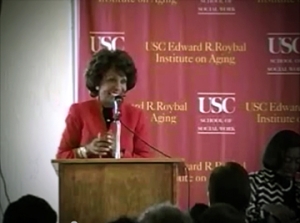Congresswoman Speaks at Advocates for African American Elders Inaugural Event
March 14, 2013 / by Vincent Lim- Research
Congresswoman Maxine Waters believes her job is to fight for the care and support of seniors, especially on the issues of Alzheimer’s disease, elder abuse, housing and quality healthcare, she said at the inaugural Advocates for African American Elders public event held in February, congratulating the similarly focused advocacy group on its outreach to the African-American community to ensure a decent quality of life for all seniors.
The event was organized to introduce the broader community to the work Advocates for African American Elders does and to honor Waters’ legacy of service and advocacy on behalf of older adults.
Associate Professor Karen Lincoln created Advocates for African American Elders, which is affiliated with the USC Roybal Institute on Aging at the USC School of Social Work, to help older African Americans in Los Angeles advocate for their health and mental health needs and improve the delivery of health services for African-American communities. Membership includes leaders from the USC Roybal Institute, Los Angeles County Department of Mental Health, Pacific Clinics, Alzheimer’s Association, AARP, Ward Economic Development Corporation, California Senior Leaders and Alliance, and local churches.
“Living in Los Angeles for only five years, I noticed a lack of a visible, organized body that highlighted issues most relevant to our African-American seniors,” said Lincoln, the group’s founder and chair. “Our seniors were not the focus of local conversations despite the fact that African Americans have had a powerful impact on the development of Los Angeles—from being part of the first settlers in 1781 to the present day.”
The advocacy group’s formation is particularly timely because the number of African Americans age 65 and older in the United States is projected to more than triple by 2050.
The percentage of individuals with chronic health conditions, such as hypertension, diabetes and obesity, is also expected to increase. Alzheimer’s disease is of particular concern for older African Americans.
“African-American seniors are twice as likely as white seniors to have Alzheimer’s disease and other dementias,” Lincoln said.
More than 5 million Americans have Alzheimer’s disease, which is the sixth leading cause of death in the United States.
“Alzheimer’s disease is taking a devastating toll on millions of American seniors and their families,” Waters said. “This is why I’ve put Alzheimer’s disease at the top of my agenda when it comes to senior citizens.”
More than half of Alzheimer’s patients will wander at some point, according to some estimates. Wanderers are vulnerable to many dangers, and it is not uncommon for some to become seriously injured or die.
“One of my biggest concerns about Alzheimer’s patients is their tendency to wander away from home,” Waters said.
Waters introduced H.R. 2800, a bill to reauthorize the Missing Alzheimer’s Disease Patient Alert Program, an initiative that helps local communities and law enforcement locate individuals with Alzheimer’s disease who have wandered away from home, or are missing, and reunite them with their families.
The bill passed the U.S. House of Representatives in 2009, but it failed to make it to the U.S. Senate floor prior to the adjournment of Congress.
Waters said she plans to reintroduce it this year.
“We are honored to recognize Congresswoman Maxine Waters for her fervent commitment to families facing this insidious disease and for her decades championing the cause,” Lincoln said.
In a show of support, Advocates for African American Elders announced a partnership with the Alzheimer’s Association, California Southland Chapter, to provide 50 scholarships to low or no-income individuals to help offset the cost of enrolling in the MedicAlert + Alzheimer’s Association Safe Return program, an emergency response service that assists law enforcement in identifying wandering or missing individuals with Alzheimer’s or a related dementia.
The USC Roybal Institute is dedicated to translational research and training that promotes and sustains optimal physical, mental, and social functioning of older persons from low-income and multiethnic backgrounds so they may age successfully in their communities. One of the ways it fulfills its mission is by fostering and strengthening community-university partnerships such as Advocates for African American Elders.
To reference the work of our faculty online, we ask that you directly quote their work where possible and attribute it to "FACULTY NAME, a professor in the USC Suzanne Dworak-Peck School of Social Work” (LINK: https://dworakpeck.usc.edu)
